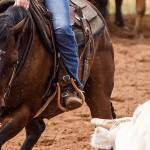Equine Osteoarthritis Study Yields Surprising Results

Veterinarians typically use commercial kits to prepare autologous conditioned serum (ACS), a regenerative therapy widely used for managing equine osteoarthritis. A new study, however, yielded surprising results, indicating that serum incubated in traditional blood collection tubes may be just as effective as using a commercial kit.*
To make ACS using a commercial kit, veterinarians collect a sample of a horse’s blood and then incubate it in special tubes containing borosilicate glass beads. The resultant serum—the watery portion of the blood remaining after the red blood cells are removed—reportedly contains concentrated levels of a protein called interleukin-1 receptor agonist or IL-1Ra. The serum also contains concentrated levels of insulin growth factor-1.
“IL-1Ra blocks the actions of the proinflammatory mediator interleukin-1, which is a major initiator of widespread inflammation in osteoarthritis. In turn, inflammation disrupts the delicate balance of breakdown and regeneration of healthy cartilage cells,” explained Kathleen Crandell, Ph.D., a nutritionist for Kentucky Equine Research.
Studies support the beneficial effects of ACS in equine osteoarthritis, with noted improvements in clinical and microscopic changes in arthritic joints following intra-articular administration of ACS. In addition to being effective, ACS is a popular regenerative therapy due to its affordability and ease of administration, all of which makes it an appealing part of a multimodal management strategy for osteoarthritis.
“Osteoarthritis has no known cure, and no true disease-modifying treatments have been identified. Instead, veterinarians are limited to controlling the clinicals signs of disease by prescribing anti-inflammatory drugs and recommending oral joint health supplements. Products containing high-quality glucosamine, chondroitin sulfate, and hyaluronic acid are backed by research and appear beneficial to arthritic horses,” Crandell said.
Because previous research groups found that serum incubated in traditional glass blood collection tubes also had concentrated levels of IL-1Ra, one of the first goals of the study was to compare IL-1Ra levels in incubated serum to those obtained using a commercial ACS kit.
Serum was collected from five lame client-owned horses that were otherwise healthy. Lame horses were selected to represent a “real-life” situation in which a blood sample would be collected from a lame patient requiring treatment. The blood samples were pooled together from those five horses and either incubated in a standard serum tube or a commercial ACS container for 24 hours. A sample of serum was also collected and not incubated to serve as a control.
“Surprisingly, the IL-1Ra levels were significantly higher in the incubated serum tube samples compared to the ACS container, but both had higher levels of IL-1Ra than unincubated serum,” explained Crandell.
In this study, the IL-1Ra levels in unincubated serum, incubated serum, and ACS were 0.4, 36.9, and 12.2 ng/mL, respectively. In other studies, the IL-1Ra levels in ACS were variable, ranging from very low levels to values as high as 89.9 ng/mL.
“This variability in IL-1Ra between studies and kits is notable and not completely understood. This was one of the few studies that used serum from older horses with osteoarthritis and may account for some of the variability compared to other studies,” explained Crandell. “Other factors that may affect the concentration of IL-1Ra in serum could be stress and underlying health issues. Further research is needed to gain a better understanding of how to best prepare a quality product.”
Until treatments like this have been further researched and refined, horse owners should continue to rely on other recommended therapies as well as high-quality joint supplements for minimizing the discomfort of osteoarthritis, Crandell suggested.
*Löfgren, M., S. Ekman, J. Ekholm, M. Engström, C.T. Fjordbakk, E. Svala, K.H. Forsström, A. Lindahl, and E. Skiöldebrand. 2022. Conditioned serum in vitro treatment of chondrocyte pellets and osteoarthritic explants. Equine Veterinary Journal:13582.








